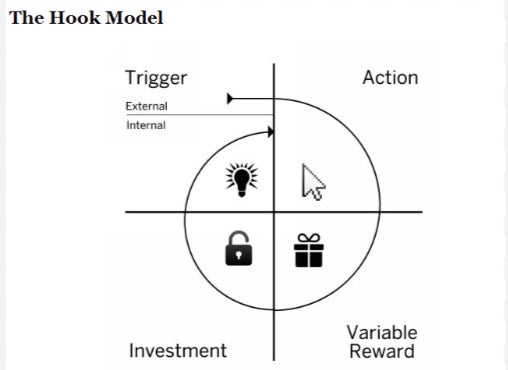Forming New Habits
Forming New Habits
By Sophie Cross
By Sophie Cross
August 6, 2024

How are Habits Formed
I’m sure many wonder what the process is for starting a new lifestyle and how people make it look so easy. While we only see another's life from looking at it from the outside, there are many things behind the scenes that take a lot of work to form what is considered a new lifestyle. Little habits are what make up routines and stepping stones for creating health and achieving certain goals. So where does all of this start? Habits are actions that are triggered in response to things in our lives, usually associated with the known outcome that we have experienced.
For example, waking up and getting physical activity. When this isn’t a normal occurrence in a routine, it sounds like a chore and something to plan and dread. When we do things like this enough, and recognize how good it makes us feel, it becomes natural to wake up and immediately expect ourselves to complete things. At some point, we can’t have as good of a day or feel ourselves if the activity doesn’t happen. Research shows that repetition of even a simple action and consistency in this action leads to the action being activated by place, timing, and habit. So, even after our motivation to do something lessens, our bodies still feel the need to complete it. Even if we aren’t able to complete the action, let's say for a few days, or on a vacation, it is much easier to get back into it and fall back into the routines we’ve created for ourselves.
How are Habits Formed
I’m sure many wonder what the process is for starting a new lifestyle and how people make it look so easy. While we only see another's life from looking at it from the outside, there are many things behind the scenes that take a lot of work to form what is considered a new lifestyle. Little habits are what make up routines and stepping stones for creating health and achieving certain goals. So where does all of this start? Habits are actions that are triggered in response to things in our lives, usually associated with the known outcome that we have experienced.
For example, waking up and getting physical activity. When this isn’t a normal occurrence in a routine, it sounds like a chore and something to plan and dread. When we do things like this enough, and recognize how good it makes us feel, it becomes natural to wake up and immediately expect ourselves to complete things. At some point, we can’t have as good of a day or feel ourselves if the activity doesn’t happen. Research shows that repetition of even a simple action and consistency in this action leads to the action being activated by place, timing, and habit. So, even after our motivation to do something lessens, our bodies still feel the need to complete it. Even if we aren’t able to complete the action, let's say for a few days, or on a vacation, it is much easier to get back into it and fall back into the routines we’ve created for ourselves.


Different Phases of Habit Forming
Although it’s easy to think that when we start doing something regularly, our brain plainly forms it into a habit right away, this is not the case. There are different stages that our brain goes through to get used to and truly experience the effects of a new habit. This first stage is called the initiation. Requiring a lot of motivation, this is when we choose to start doing something that we are not used to, and stick to it. We can’t just eat healthy one day and mindlessly continue the patterns. It truly does take discipline to get through this stage, which is where many people seem to give up. Next is the learning phase. This is when we keep repeating our desired new habits, and learn how to push past the harder parts or wanting to give up. We learn how to work it into our lives and make it suitable for ourselves.
This is the most important piece of information to me, because I do know that not everyone's situation is the same. Different jobs, responsibilities, and personal abilities make habit forming subjective for everybody. This part is so important! Finding how to fit new things into our lives and make them doable for any situation is what learning is all about. The last phase is the stability phase. This is when the habit is fully formed, becoming a new part of our life. This is also when it doesn’t feel like as much of a challenge anymore, and becomes the new normal. Now, it’s easy to read this and think that all of these things can happen at once, but that just isn’t how the brain works. So how much time does it actually take for a real habit to form?
Different Phases of Habit Forming
Although it’s easy to think that when we start doing something regularly, our brain plainly forms it into a habit right away, this is not the case. There are different stages that our brain goes through to get used to and truly experience the effects of a new habit. This first stage is called the initiation. Requiring a lot of motivation, this is when we choose to start doing something that we are not used to, and stick to it. We can’t just eat healthy one day and mindlessly continue the patterns. It truly does take discipline to get through this stage, which is where many people seem to give up. Next is the learning phase. This is when we keep repeating our desired new habits, and learn how to push past the harder parts or wanting to give up. We learn how to work it into our lives and make it suitable for ourselves.
This is the most important piece of information to me, because I do know that not everyone's situation is the same. Different jobs, responsibilities, and personal abilities make habit forming subjective for everybody. This part is so important! Finding how to fit new things into our lives and make them doable for any situation is what learning is all about. The last phase is the stability phase. This is when the habit is fully formed, becoming a new part of our life. This is also when it doesn’t feel like as much of a challenge anymore, and becomes the new normal. Now, it’s easy to read this and think that all of these things can happen at once, but that just isn’t how the brain works. So how much time does it actually take for a real habit to form?


How long Does It Take Habits to Form
You may have heard once or twice that “it takes 21 days to form a habit”. This myth has been spread by many people for a very long time. Many “self-help” professionals have broadcasted this idea and have failed to really elaborate on the topic. Because of this fast spreading idea, many people decided to really study the topic and get to the bottom of it. A study by Phillippa Lally watched a group of 96 people over 12 weeks, giving them a new habit to start and see how long it would really take to form. On average, the consensus was that it takes 66 days to reach the secure stage of habit formation. So, if we choose to eat healthier or incorporate healthy snacks into our diet for 66 days straight, it is scientifically proven that this will stick, and become much easier to maintain.
How long Does It Take Habits to Form
You may have heard once or twice that “it takes 21 days to form a habit”. This myth has been spread by many people for a very long time. Many “self-help” professionals have broadcasted this idea and have failed to really elaborate on the topic. Because of this fast spreading idea, many people decided to really study the topic and get to the bottom of it. A study by Phillippa Lally watched a group of 96 people over 12 weeks, giving them a new habit to start and see how long it would really take to form. On average, the consensus was that it takes 66 days to reach the secure stage of habit formation. So, if we choose to eat healthier or incorporate healthy snacks into our diet for 66 days straight, it is scientifically proven that this will stick, and become much easier to maintain.


What is The Difference Between Forming Healthy Habits and Unhealthy Ones
There truly isn’t a difference whether we are forming positive habits for ourselves or negative ones. Both take the same amount of time and commitment. So you may be wondering, why is it so much harder for me to keep a good habit, like eating cleaner, than a bad one. This is due to the immediate response we get in our brain from doing something pleasurable. In the immediate moment, eating a donut first thing in the morning probably makes one happy, so there is a reward feeling right after. We may not get this same feeling in the beginning of starting a healthier diet. But, throughout the day or over time, the donut would make anyone feel worse. I think a lot of the long term habit formation relies on looking at our own bigger picture. If we prioritize how we want to feel overall and long term, the healthier choices will start to feel easier.
Adopting these healthier choices can improve our lives in drastic ways, and getting in a good routine is the first step to really changing a lifestyle. Unlearning unhealthy practices is undeniably very difficult, but with time and effort it can make huge differences.
What is The Difference Between Forming Healthy Habits and Unhealthy Ones
There truly isn’t a difference whether we are forming positive habits for ourselves or negative ones. Both take the same amount of time and commitment. So you may be wondering, why is it so much harder for me to keep a good habit, like eating cleaner, than a bad one. This is due to the immediate response we get in our brain from doing something pleasurable. In the immediate moment, eating a donut first thing in the morning probably makes one happy, so there is a reward feeling right after. We may not get this same feeling in the beginning of starting a healthier diet. But, throughout the day or over time, the donut would make anyone feel worse. I think a lot of the long term habit formation relies on looking at our own bigger picture. If we prioritize how we want to feel overall and long term, the healthier choices will start to feel easier.
Adopting these healthier choices can improve our lives in drastic ways, and getting in a good routine is the first step to really changing a lifestyle. Unlearning unhealthy practices is undeniably very difficult, but with time and effort it can make huge differences.


